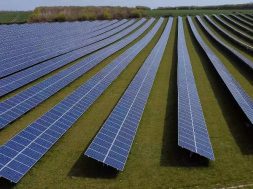
First Solar Comes Out in Favor of a Section 201 Trade Case Remedy
The thin-film solar manufacturer has joined with trade case petitioners Suniva and SolarWorld.
-by Julia Pyper
First Solar, the largest U.S.-based solar panel manufacturer, has been relatively quiet about the controversial Section 201 trade case brought by U.S.-based crystalline silicon PV manufacturers Suniva and SolarWorld Americas. That is, until now.
This week, the company broke its silence and broke rank with the Solar Energy Industries Association (SEIA), of which First Solar is a board member.
In a letter filed Tuesday, First Solar urged the U.S. International Trade Commission (ITC) to put in place a remedy that protects U.S. cell and module manufacturers. According to Goldman Sachs analysts, this is the first time the company has publicly offered support for a remedy in the case.
“For years, CSPV import prices have been anything but rational, falling much more rapidly than could be explained by cost improvements achieved on a commercial basis,” First Solar CEO Mark Widmar wrote to the ITC. “The root cause of this phenomenon has been massive CSPV overcapacity, particularly in Asia, that is inconsistent with market-based investment behavior. U.S. CSPV producers will not get the breathing space they need unless CSPV import prices rise to rational levels and this overcapacity is addressed.”
First Solar’s position doesn’t come entirely by surprise. Because the company makes thin-film solar modules, it is exempt from trade remedies on crystalline silicon PV (CSPV) products. Furthermore, while First Solar manufactures the majority of its products in Malaysia and is in the process of ramping up production in Vietnam, it also has a meaningful U.S. manufacturing presence in Ohio.
First Solar’s cadmium telluride thin-film products are exempt from the Section 201 trade case no matter where they’re made. The benefit of having a U.S. facility is that the company will have easy access to the expected uptick in thin-film demand — which also stands to benefit thin-film module makers Solar Frontier and U.S.-based Stion.
“First Solar would likely see the most benefit if a meaningful remedy is put in place. They are production cost and price competitive, so they can continue to offer a competitive price and get a sustainable margin,” said GTM Research analyst Jade Jones. “They have scaled tariff free production capacity — with First Solar’s total capacity exceeding current U.S. [crystalline silicon] cell capacity. And they are bankable with a strong brand.”
That last point is important, Jones added, because even if a remedy is put in place, SolarWorld and Suniva will undergo a restructuring and buyers will have real questions about bankability and whether the companies can serve their warranties.
In its letter to the ITC, First Solar argues that, like Suniva and SolarWorld Americas, it was negatively impacted by imports pf crystalline silicon PV products in 2016. U.S. solar manufacturers need protections from these foreign imports and an effective remedy can exist along with continued growth in U.S. solar demand, First Solar wrote, but did not offer a solution.
The notion that remedies proposed by trade case petitioners would allow for continued growth in U.S. solar demand is the exact opposite of what SEIA has been arguing. GTM Research analyst MJ Shiao testified before the ITC last week that a 30 cent per watt tariff on solar cells, with annual step-downs (which is similar to what Suniva and SolarWorld have proposed), would reduce expected solar deployments by 38 percent through 2021.
Up to 84,000 people stand to lose their jobs by 2020 as a result of Sunvia and SolarWorld’s requested trade remedies, according to SEIA. While projects that pencil out would continue to be installed in the U.S., trade remedies would have a severe dampening effect. The trade group’s proposed solution is to offer the two trade case petitioners up to $10 million per year to help them achieve scale and compete in all segments of the solar market.
SEIA, along with all other stakeholders, filed its final comments on the trade case on October 10. The trade group has also started reaching out to the Trump administration, since the president will have the final say on what the trade remedies will be.
In addition to backing SolarWorld and Suniva’s petition, First Solar said that it was “disappointed” in SEIA for not engaging constructively in the trade case proceedings.
“While we value First Solar’s membership in SEIA, we respectfully disagree with its characterization of SEIA’s engagement as well as its assessment of the impact trade relief would have on the domestic industry,” said Abigail Ross Hopper, SEIA’s president and CEO. “The claim that we have not engaged constructively in the trade case is demonstrably false.”
“While we disagreed with the ITC ruling in favor of the Petitioners’ regarding injury, we nevertheless proposed a creative and constructive way to support the CSPV manufacturing industry in the United States that would benefit the Petitioners,” she added. “SEIA remains convinced that punishing tariffs are not the answer. We hope to work with all parties, including First Solar, to identify solutions that don’t cause tens of thousands of lost American jobs and halt the growth of the broader solar industry.”
Tesla, which has also been relatively quiet about the trade case, filed a letter against Suniva and SolarWorld’s petition this week precisely because of the broader industry effects.
Elon Musk’s company is currently building the largest crystalline silicon PV cell and module factory in the U.S. and, therefore, stands to benefit from tariffs or quotas placed on foreign crystalline silicon products. However, the company said it opposes the proceeding “because it threatens to significantly harm the U.S. solar industry at large and also because any import restrictions arising from this proceeding could negatively impact Tesla’s U.S. production plans.”
The ITC will issue recommendations for a proposed remedy by November 13. President Trump will have 60 days to make the ultimate decision.












